Knowing where one works can assist in most cases. You might be interested in reconnecting with an old friend, checking in with a business connection, or simply verifying the facts to be on the safe side. However, you must abide by both moral and legal regulations.
There are a number of online and offline ways that can provide hints regarding the workplace of a person. This guide covers how one can safely search without overstepping the privacy limits.
Is it legal to find where someone works?
Yes, it can be legal to find where someone works, but only when done responsibly. The Fair Credit Reporting Act (FCRA) in the U.S. ensures the safety of information about people and restricts the use of data relevant to employment. You cannot apply informal ways of hiring or conducting background checks. In Europe, the General Data Protection Regulation (GDPR) has stringent rules regarding the collection, sharing, and storage of personal information. You should have a legitimate purpose and cannot abuse the data of another person.
The search of publicly available information, including LinkedIn profiles or company directories, is not usually restricted. Hacking, stalking, or accessing confidential information is not permitted. Never violate privacy laws and never do anything that may seem intrusive or unsafe.
How to Find Out Where Someone Works
When you know where to check, you can find the place of work of a person. Numerous resources scan the information of people, and even minor hints in social media or directories can bring you to the correct business. Ethical steps should only be used to find where someone works for free. Begin with a simple web search and go further where necessary.
Look up on People Finder Website
PeopleFinder is an online directory of popularity that obtains the records of all people, phone information, address history and, in some cases, employment history. It assists you in determining whether an individual is connected to a business, an address at a workplace or a company listing. It is easy to operate and it draws information based on reliable social sources.
Steps
- Type the person’s name in the search box.
- Add city or state for accuracy.
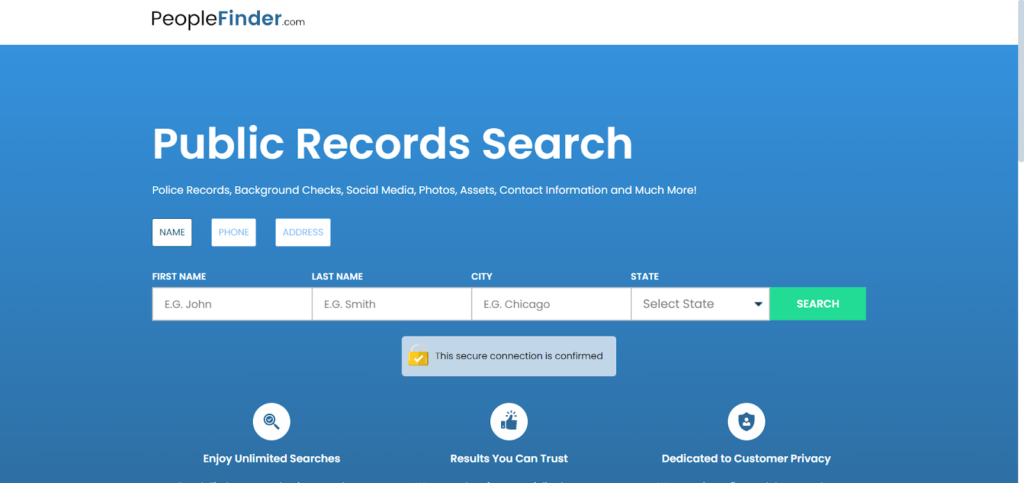
- Review the report for job details, business connections, or company addresses.
- Cross-check the findings with other sources to confirm accuracy.
Find Workplace by Number
You can sometimes find a person’s workplace by running a reverse phone number search. One popular website for this is Cellphone Location, which provides detailed information linked to a number, including the owner’s name, carrier, associated social profiles, and business-related data.
It scans public records, telecom databases, and online directories to match the number with possible professional details. The platform is designed for quick, secure, and anonymous searches, making it useful for verifying unknown callers.
Steps
- Enter the phone number into a reverse lookup tool.
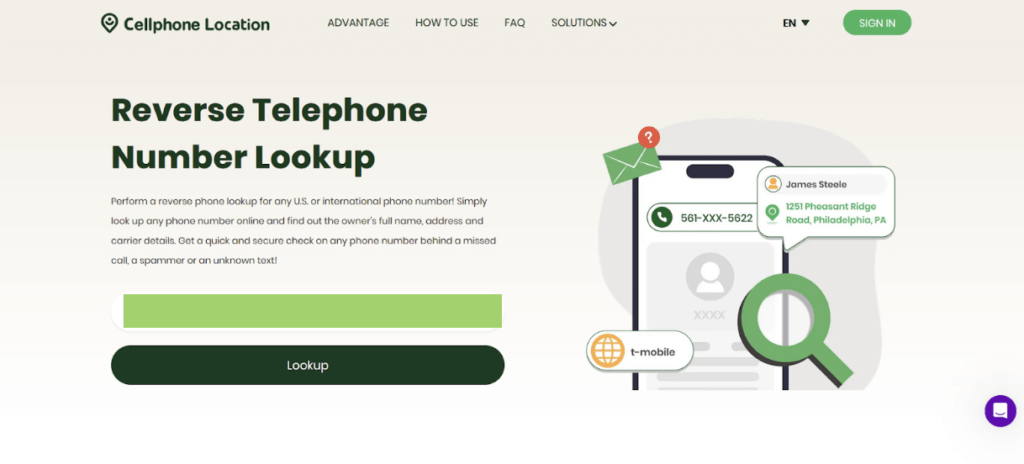
- Now, provide your email address to receive the details.
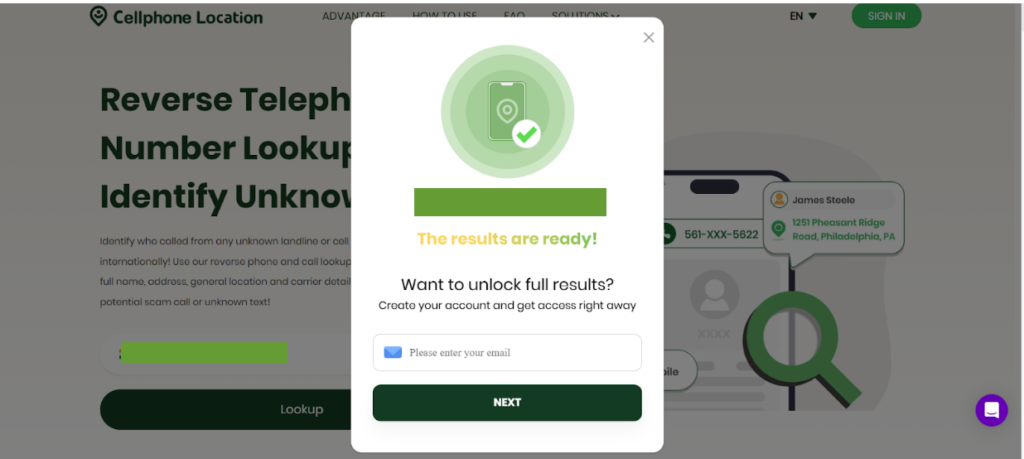
- The system scans public records, business directories, and online profiles.
- Review the results to see if the number is linked to a company, business listing, or work-related contact information.
Check Social Media
Social media often reveals job titles, company names, or work-related posts. Many people share their career updates online. Checking their profiles can give clear clues about their workplace.
LinkedIn is the most reliable platform to find professional information. Most users update their job titles, companies, skills, and work history. Companies also tag employees on official pages. You can use keywords, names, and location filters to identify where someone currently works or recently worked.
Steps
- Search their name on LinkedIn.
- Compare profile details like photo, location, and past jobs.
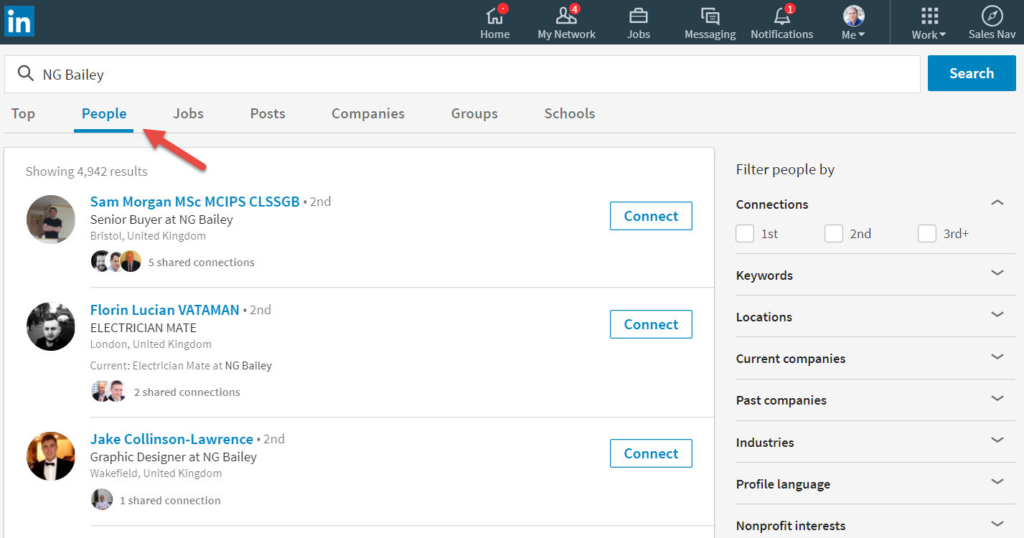
- Check current job entry, company page, and posts.
- Look at endorsements or colleague connections for more confirmation.
Facebook mixes personal and professional information. Many users list their workplace in the “About” section or share posts related to their company. Friends may also tag them at work events. You can search their name and browse through posts and profile details for work clues.
Steps
- Search the person’s profile.

- Check the “About” section for workplace details.

- Look at photos, posts, or check-ins.
- Scan tagged posts by friends that mention their company or job role.
Use Search Engine
Search engines like Google often show interviews, company mentions, social media links, or business directories. A simple name search can reveal job listings, public profiles, or articles where the person is mentioned with their workplace. It’s one of the quickest ways to collect clues.
Steps
- Type the full name with quotation marks.
- Add keywords like “company,” “job,” or “work.”

- Check results including news, profiles, and directories.
- Verify accuracy by matching location and other details.
Search Company Website
Interviews, company mentions, social media links, or business directories are frequent results of search engines, such as Google. Even a basic name search can provide job opportunities, profiles on the internet, or articles in which the individual has been listed with a place of work. It is one of the fastest means of gathering leads.
Steps
- Visit the company site.
- Go to the “Team” or “About Us” page.

- Scroll through employee listings.
- Match their photo, role, or posted bio. Use contact forms if you need general confirmation.
Check Public Records & Background Checks
Most organizations have employees posted on the official webpage, particularly professional jobs such as physicians, lawyers, real estate agents, managers, or consultants. These directories tend to display photographs, work titles, and contacts. This is an excellent technique in case you have a rough idea of the potential company.
Steps
- Search their name on public record portals.
- Look for business filings, licenses, or company associations.
- Use trusted background check sites only.
- Cross-check findings to avoid mistakes.
Talk to the Company’s HR
In case you know the company already, but have to check, it can be helpful to call the HR department. In some cases, HR departments can verify an individual’s employment, particularly when the complaint is about safety or legal issues or even professional authentication.
They will, however, not reveal personal information, personal records, or sensitive information. They can only verify the basic employment status when your request is real, noble, and validated by a proper reason.
Use Job-Seeking Websites
Jobs websites such as Glassdoor display job reviews, company information and occasionally user-sourced information. When individuals post reviews, they refer to their departments or positions. These hints can lead to linking a user to a certain company in case their profile or username has distinguishing information.
Steps
- Search the company name.
- Browse reviews or profiles.
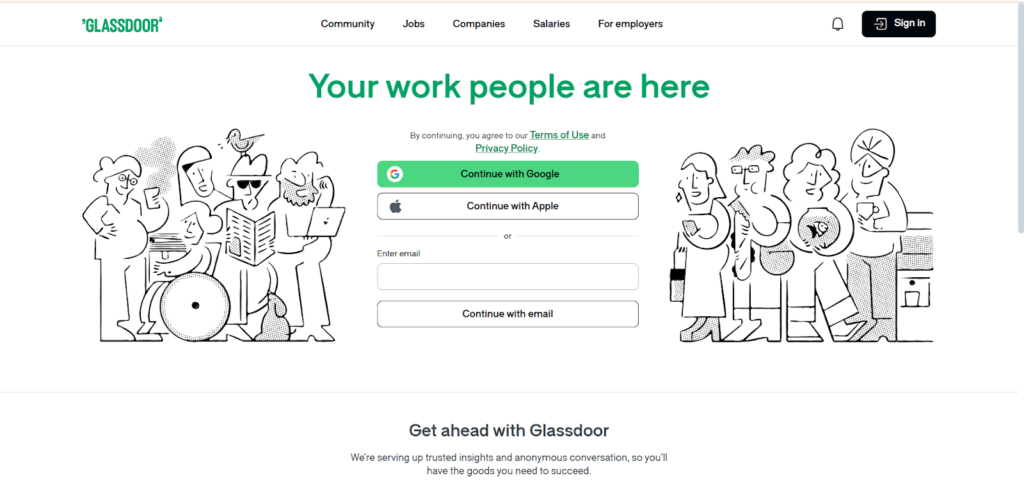
- Look for hints linked to the person’s name or role.
- Use information only to verify, not to assume.
Ask Mutual Contacts
The easiest way to locate the place of employment of a mutually acquainted person is often the simplest, and it is to ask another person. Their workplace may be familiar to friends, colleagues, neighbors, or community members. Be polite and state the reasons as to why you are asking. Pressurizing someone who appears reluctant or uncomfortable disclosing information is also not advisable.
Value privacy and privacy limits and only gather information for good, genuine, and safe purposes. Ethical communication creates trust and avoids misunderstanding.
Search With SSN Number
Official background checks using a Social Security Number will disclose work records. You, however, have to be authorized by law. The SSNs are used to confirm identity and employment records to employers, landlords, and authorized agencies. Misuse of SSN information is unlawful and punishable.
Steps
- Use only legally approved platforms.
- Enter the SSN carefully.
- Review official employment records.
- Confirm details through authorized channels only.
FAQ
- Do background checks show employment history?
Yes. Legal background checks may indicate previous employment history, such as job descriptions and dates of employment. These checks operate verified databases. They can only be seen when the screening is conducted using the authorized services that comply with and respect the privacy laws
- Can a private investigator find out where someone works?
Yes. Through public records, databases, and observation, licensed private investigators are able to locate the place of work of someone. They are guided by a stringent law. They are not able to crack accounts or have access to restricted data, yet they can gather lawful information skillfully.
- How can I find someone’s workplace using only their name?
Search their name on LinkedIn, Google, and people finder websites. Add location or industry keywords to narrow results. Social media profiles, directories, and public mentions can reveal their current or past workplace details.
- Can I find someone’s workplace using their email address?
Yes. If the email connects to professional profiles, it may reveal workplace details. Search the email on Google or social media. The domain itself can reveal the company, especially if it ends with an organization’s name.
Conclusion
Finding where someone works becomes easier when you use the right tools and follow a clear process. Social media, people-search, and search engine platforms, as well as public records, may provide good indications of where a person is working. Always keep the legal and ethical lines when collecting information. Do not use intrusive approaches and respect personal privacy. Always make use of the information you come across only in good, secure, and responsible ways that safeguard yourself and the other individual.